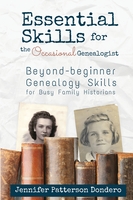
Not all genealogy research can be fast (ok, maybe I should say, most genealogy research is not fast). Even with online searches available, sometimes it just takes time to use online records.
Here are 10 FREE online U.S. Record Collections that are worth the time, even if you have to use them later.
1. FamilySearch
So my other list (10 Easy to Search, FREE U.S. Record Collections) started with FamilySearch, as well. There's a reason. It may be the most amazing free site out there. But since this list is for collections to search later, I want to make sure you are aware of this "slower" way of using FamilySearch.
Yes, you can use the search forms to "search" the record collections. But, one of the amazing things FamilySearch does is make collections available before they are indexed (you might have to wait a long time for indexing to be complete, otherwise). If they aren't indexed, that means they aren't searchable. "Whoa!" you say, "how do I use them?" Good question.
These collections are "browse only" and basically, it's like using microfilm (because they are digitized microfilm).
You can find more information elsewhere including YouTube if you need to see what to do. See the update below.
UPDATE: You can now access all collections through the Images search at FamilySearch (see the comment from Jan at the end of the post). This (currently) only shows some information which I find difficult to use being used to using these records via the catalog and other traditionally cataloged methods. However, if you're just getting started browsing records, you probably won't notice.
I recommend looking at the FamilySearch catalog to develop your knowledge of records. Access the FamilySearch/Family History Library Catalog from this link. To find all the available online records, use the image search.
2. Google News Archive
You may know about Google News but many genealogists don't know about "Google News Archive." Google News is an active project, however, the "Archive" is no longer updated. Thankfully it is still fully functional.
It began as a project to digitize historic newspapers and was eventually abandoned. Because the papers are searchable via OCR, you will often (if not always) need to browse the paper and dates you are interested in (once again, it's just like using microfilm). There are a bunch of quirks to using this "collection" but I'm not going into all of them here. There are many genealogy posts about using Google News Archive.
3. Chronicling America
I'm going to keep this one short. Chronicling America is the Library of Congress's collection of historic, digitized newspapers. They will only go through 1922 at the latest (and then copyright kicks in). They are just as random and spotty as Google News Archive and possibly harder to search. You can, of course, browse them (do you see why this list is collections to use later?).
4. Revolutionary War Pensions Index at Fold3
The complete pensions are on Fold3 but are not free (they are also on Ancestry.com if you only have access to one or the other). You can search the index for free and many local libraries provide free access to Fold3. These are actually very searchable (unlike many of the other entries in this list).
The complete (not "select") Revolutionary War Pensions have been every name indexed on Fold3 which is why I've included the index here. You aren't just limited to searching for a soldier. You can search for someone who might have given an affidavit or was a court officer, as well as named family members.
Users can also annotate records which adds to the "index" and can include any text, not just names. Usually, you will need to access the image (the part that isn't free) to determine if it's your person.
Note: A number of the other collections on Fold3 are free including the Pennsylvania Archives.
5. War of 1812 Pensions on Fold3
These are completely free but currently, digitization is not complete (they're working on it). I am not sure how the indexing is being done and I don't see a description on the collection page.
My guess is the index is the same as the old microfilmed card indexes, soldier's name and if there is a widow or minor receiving the pension, her/his name(s).
You will probably need to read a number of pensions unless you know the exact service of your ancestor. I also suggest looking for people that served with your ancestor and reading their pension.
It takes more than typing in a search box to utilize some of the best online sources.
6. Digitized County Histories (Internet Archive and Google Books)
This is really a record type you can find in various collections. I have the most luck with Internet Archive and Google Books but you'll find county histories on Ancestry.com, FamilySearch Books, Hathi Trust, and many state or county websites. I usually search for a location if I want a county history or "biographical history." Once I find it is digitized, I then search it for the surname or topics I'm looking for.
County histories usually rely on OCR searches so they aren't always great as far as the search quality. The physical books were often unindexed, so digitized copies are much easier to use since you can search them, even if it's imperfect.
I've had the best luck with searching the contents of the books on Google Books (unlike the Google News Archive where I've never had much luck searching).
7. Atlas of Historical County Boundaries
This site had some issues with their online interactive map. However, they also have downloadable files. If you need to do land research these can be invaluable.
I often use the KMZ files in Google maps (picking and choosing just the files I need). These can help when your ancestors actually purchased land and you are mapping that land. Or you might have a land description on something as common as a federal census record (usually possible with townships and ranges).
What's helpful is you identify the land, and then you can change the date in Google Maps to see what the county boundaries were at other times. This can reveal other counties you should research---even if your ancestors didn't move.
Similarly, you might notice your ancestor lived right on a border meaning it's possible he did business in the adjoining county.
8. BLM/GLO
This suggestion is best for genealogists with some experience. So, if you know your ancestor lived in a federal land state OR may have gotten federal land for military service, this is a free online database to help you identify that land and the records created when transferring the land from the federal government to the individual.
If you need to learn more about military bounty land, a great book is Christine Rose's Military Bounty Land 1776-1855 (affiliate link). I have an entire post about bounty land, too.
9. Georgia Virtual Vault
I included the South Carolina Archive's online collections in my "easy" list. It is pretty fast to search. Georgia's Virtual Vault (the online collections for the Georgia Archives) is not as easy to search but may contain more material.
It's not as easy to search because it is digital images of microfilmed original records, that means OCR isn't too helpful. You will need to browse most collections.
If you have Georgia research, you should make yourself familiar with the Virtual Vault.
10. Cyndi's List
If you don't know what Cyndi's List is, you're missing out. Cyndi Ingle started a website of genealogy links over two decades ago. It's grown to be massive. I've made it number ten because this is a short list, it doesn't cover most "specialty" topics. Cyndi's List does!
When I was advancing my genealogy skills beyond being a beginner (which coincided with the first times I had Internet access and then high-speed Internet), I relied on Cyndi's List as a resource to learn more about whatever I needed to learn. I still use it, particularly for the less-mainstream topics I might be researching.
Take a look at these websites and figure out what will help you. Some of them you just need to be aware exist and use them when appropriate. Others you'll need to make a research plan and keep track of your research.
Not everything you need for genealogy research is online. Make sure you take the time to use what is, though. It takes more than typing in a search box to utilize some of the best online sources.
Do you have a favorite online source you'd recommend "to search later?" Leave a comment below.










